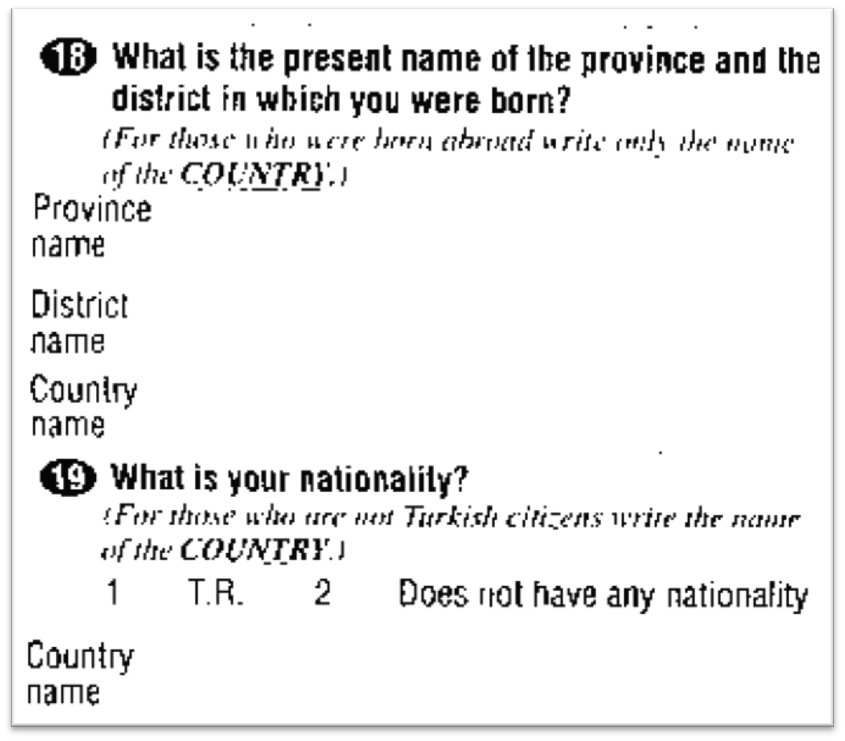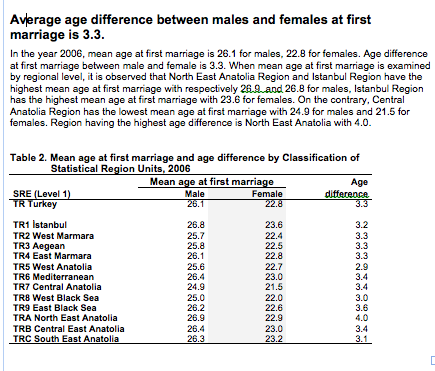Though disparities are prevalent among different ethnic groups in Turkey, the Turkish government has not recognized different ethnic groups since its founding, and therefore does not allow for ethnic-specific differentiation within its censuses. The past six Turkish censuses (2006-2012) have not included questions regarding nationality, language, or racial identity (TurkStat 2006-2012); and prior to 2006, a fill in the blank nationality approach was used (2000 Turkish Census). The Turkish system therefore resembles that of France, which has attempted to create a centralized French nationality by ignoring racial differences. This is drastically different from the United States, South Africa, and Rwanda, whose institutions explicitly define racial categories. In those countries, racial categories have been a historical proxy for de jure discrimination, but have more modernly been used to track existing discrimination patterns and attempt to reverse them. Identifying racial categories enables marginalized groups to legislatively seek retribution. In Turkey, the lack of recognition of the Kurds as a separate race has meant their discrimination has been left unpunished and unchecked by the Turkish government.
Censuses
2000 Turkish Census, page 1

This image of the 2000 Turkish census shows how the government keeps Kurds unidentifiable. Here, respondents are asked about their region of inhabitance, but no race or ethnicity question exists.
2000 Turkish Survey, page 3
This image depicts the third page of the 2000 Turkish Census. There still exists no question regarding ethnicity or race and the a fill-in-the black question regarding nationality is not useful for differentiating Kurds. The nationality question reads “What is your nationality (for those who are not Turkish citizens write the name of the COUNTRY)”. Though Kurds see themselves as their own nation, they reside within the countries of Iraq, Turkey, Syria, and Iran (Kurdistan) and do not have a recognized country of their own. Therefore, this question neither allows for their differentiation from Iraqi, Syrian, or Irani immigrants within Turkey, nor from Turkish residents on the whole. Therefore this question is designed so that Kurdish people cannot express themselves as a population, and identify themselves on the census. If the question asked respondents to simply state their nationality, without the requirement of a recognized nation-state, the Kurds would be able to identify themselves.
The Turkish Statistical Institute
The previous image is an excerpt from the Turkish Statistical Institute’s June 27, 2007 Press Release. This adequately depicts all “Demographic Statistics” data released by the Turkish Statistical Institute (TurkStat) from the past six years. TurkStat’s demographic reports contain information about marriage, divorce and birth rates within Turkey. And consistently with the census data previously displayed, these differentiates participants by region, rather than race, ethnicity or nationality (TurkStat 2006-2012).
The full 2011 press release can be seen here:
Implications
The lack of government recognition of race has a few consequences. First, Turkey has a ethnic order rather than a racial order. Because the government does not officially recognize the presence of minority groups, group affiliation is based in self-identification; meaning, the government treats groups such as the Kurds not as a separate race, but as an ethnic group choosing not to assimilate to mainstream culture. Therefore, the Kurds are depicted “rebel” group (France-Presse) of anti-loyal Turkish residents, rather than a minority nation.
As a result of this negative depiction, those who identify as Kurdish – through the use of political activism or language – are subject to intense prejudice that is not corrected by the government. In countries with racial orders, such as the United States and South Africa, the government is able to combat societal prejudices though legislation such as affirmative action or anti-discrimination laws. However, in Turkey, Kurdish prejudices are not quantified because the Kurds are not recognized as a separate race.
The lack of a national identification system makes it more difficult to track prejudices within Turkey along ethnicity. National surveys, such as the census, track disparities along regional lines, rather than ethnic lines. Though regions are often predictive in that Kurdish populations are highly concentrated in the Southeastern Anatolia Region and the Eastern Anatolia Region, the do not provide a perfect substitute for data differentiated by ethnicity or nationality. So although regional disparities can lend information about ethnic disparities, the government can attribute these differences in regional culture, geography, and economy.
The first step to addressing prejudice is acknowledging it; and as of yet, the Turkish government refuses to document the presence of non-Turkish ethnic groups. In order to attain more transparent information about Kurds and combat disparities, it becomes necessary for the government to officially recognize them as a separate racial group, if not a minority nation.



